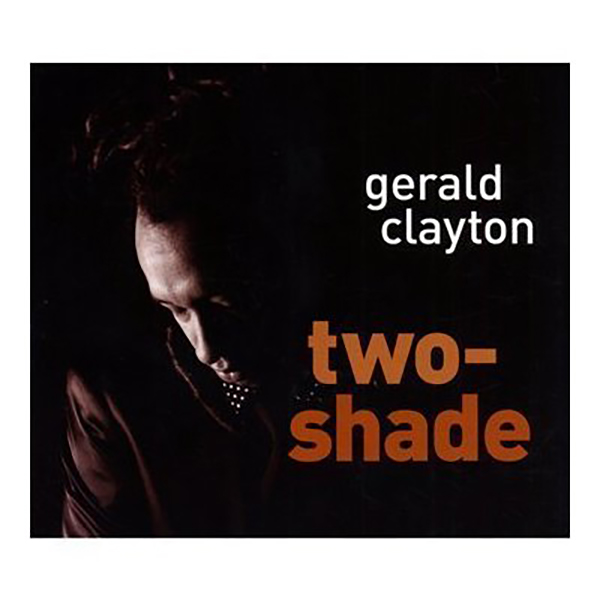
by Ian Mann
November 05, 2009
/ ALBUM
The sound of a precociously talented young man realising his potential
The young pianist Gerald Clayton (aged 24) has been causing quite a stir on the US jazz scene. Born in Holland but raised in Los Angeles Clayton was born into a musical family and has recorded with the Clayton Brothers band led by his bassist father John and saxophonist uncle, Jeff.
Now based in New York the young Clayton first came to real prominence when working with trumpeter Roy Hargrove’s band. He has also collaborated with singers Gretchen Parlato and Diana Krall and has supported Herbie Hancock at the Umbria Jazz Festival.
“Two Shade” is Clayton’s recording début as a leader and finds him working in the piano trio format with his regular partners bassist Joe Sanders and drummer Justin Brown. It’s a supremely confident début that finds Clayton exploring a variety of musical ideas. Despite his tender years he has a thorough grounding in the jazz tradition and a finely honed technique. Perhaps this should come as no surprise given his family connections and the fact that pianists Monty Alexander, Kenny Barron and Mulgrew Miller are among the many teachers acknowledged in the album’s liner notes.
Clayton is adept at taking established jazz ideas and placing them in a contemporary setting. There are plenty of the traditional jazz virtues on “Two Shade” but Clayton and his colleagues balance these with the enthusiasm and exuberance of youth. Despite it’s conventional elements “Two Shade” is unmistakably a “now” album. Clayton comprehensively succeeds in his aims to establish in his own words “a balance between the old and the new”.“Tradition and innovation can peacefully co-exist” he says and this album is a good summation of those ideals.
The effervescent “Boogablues” gets the album off to a storming start but this is by no means the by rote boogie or blues the title might suggest. Sanders and Brown are an intelligent and flexible rhythm team who lay down some interesting and unmistakably contemporary grooves whilst interacting well with Clayton. There are plenty of clever musical ideas going on here and Sanders’ solo is particularly impressive.
The same qualities are more apparent in the more oblique “Trapped In A Dream”. The Clayton Trio explore their themes with the same questing spirit as Brad Mehldau but their approach is less cerebral and more rooted in the jazz tradition.
Clayton’s notes explain that “two- shade” is “a single colour created when two colours are fused. Not to be confused with two shades.” This is well illustrated on “Two Heads, One Pillow” a stirring combination of jazz piano and hip hop inspired drumming. I can even forgive the mercifully brief vocal, presumably by Clayton himself. Brown throws off the shackles in the later stages of the tune turning in a bravura drumming performance opposite Clayton. There’s even room for a cod jazz outro.
After the fireworks “Peace For The Moment”, initially haunting and ballad like with Sanders on bowed bass in the tune’s early stages. However Brown’s quirky drumming constantly threatens to take the tune somewhere else and the momentum quickly builds into something more urgent and outgoing. As Clayton observes “Rhythm works in seemingly contradictory ways. It provides balance and imbalance, conveys feelings of steadiness as well as unease”. After another period of calm there’s another towering performance from Brown in yet another face off with Clayton. This is a very much a tune that goes on a journey, from the serene to the tempestuous, all the while retaining a sense of inner logic.
Clayton and his colleagues dazzle with their version of Cole Porter’s “All Of You” especially on the free-wheeling mid section where Brown once again excels. This is followed by the brief “Love All Around”, effectively little more than an interlude albeit an energetic and arresting one.
“Casiotone Pothole” is the oddest track on the album with it’s eerie treated wordless vocal and faint air of unease. Nonetheless there’s some fine playing here too, particularly by Clayton on an expansive and unhurried piano solo. It’s also the most contemporary sounding track, a trait continued by the stop/start grooves of the following “One Two You”. Once again the interplay between Clayton and Brown is stunning but on the gently lyrical “Sunny Day Go” it’s the dialogue between Clayton and bassist Sanders that impresses.
“Scrimmage” is the kind of energetic swinger it’s title suggests with great rapport being demonstrated by the trio as they negotiate it’s tricky twists and turns. There’s something of a drum feature for the impressive Brown who shines throughout the album.
“You’re Out” is a brief but energetic excerpt, presumably edited from a lengthier piece, possibly a jam, again with Brown at full throttle.
A leisurely and lyrical exploration of Dizzy Gillespie’s “Con Alma” closes the album on a surprisingly quiet note given some of the earlier fireworks.
“Two Shade” is the sound of a precociously talented young man realising his potential. Expect to hear a lot more of Gerald Clayton- and of Joe Sanders and Justin Brown too, come to that- this is an impressive performance all round. Conscious of ,but not in thrall to the tradition “Two Shade” combines adventurousness with accessibility and should help to put the names of Clayton and his colleagues firmly on the jazz map.
Clayton is due to make two appearances at the 2009 London Jazz Festival. On November 15th he appears at the Pizza Express Jazz Club with singer Gretchen Parlato and on November 20th he opens for Madeleine Peyroux at the Royal Festival Hall.